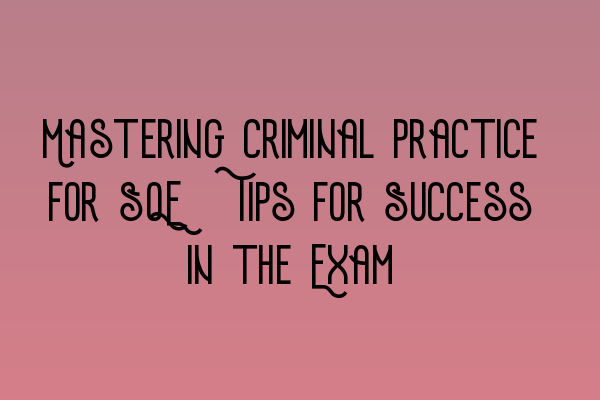Mastering Criminal Practice for SQE: Tips for Success in the Exam
The Solicitors Qualifying Examination (SQE) is a crucial step in becoming a qualified solicitor in the UK. The Criminal Law & Practice module of the SQE assesses your knowledge and understanding of criminal law, criminal litigation, and criminal advocacy. To help you prepare for this challenging exam, we have compiled a list of tips and strategies that will assist you in mastering criminal practice for SQE.
1. Understand the Exam Format and Syllabus
The first step towards success is familiarizing yourself with the exam format and syllabus. The SQE Criminal Law & Practice exam typically consists of multiple-choice questions, scenario-based questions, and written assessments. Reviewing the exam structure, content areas, and sample questions will give you a clear idea of what to expect. Consider taking SQE 1 Practice Exam Questions and SQE 1 Practice Mocks FLK1 FLK2 to further enhance your understanding.
2. Develop a Study Plan
Creating a comprehensive study plan is essential for effective exam preparation. Divide your study time into manageable sessions, focusing on different topics each day. Allocate sufficient time to understand key legal principles, case law, legislation, and procedural rules. Practice applying legal knowledge to realistic scenarios to build your analytical and problem-solving skills. Consider enrolling in SQE 2 Preparation Courses and SQE 1 Preparation Courses to receive guidance from experienced tutors.
3. Review Key Criminal Law Concepts
Pay close attention to fundamental criminal law concepts, such as actus reus, mens rea, causation, and criminal defenses. Familiarize yourself with the elements of major criminal offenses, including murder, theft, assault, and fraud. Understanding the essential elements of each offense will enable you to identify relevant issues and apply the law accurately in exam scenarios.
4. Study Criminal Procedure and Evidence
Criminal procedure and evidence play a crucial role in criminal practice. Familiarize yourself with the different stages of criminal proceedings, such as arrest, charging, bail, and trial. Understand the rules of evidence, including admissibility, hearsay, and expert opinion. Developing a solid understanding of criminal procedure and evidence will allow you to analyze case scenarios effectively.
5. Practice Criminal Advocacy
Criminal advocacy is a significant aspect of the SQE Criminal Law & Practice exam. Develop your skills in presenting legal arguments, cross-examining witnesses, and addressing the court. Practice oral advocacy through mock trial exercises to enhance your courtroom presence and persuasive abilities. Utilize the practice mocks to refine your advocacy skills.
6. Stay Updated with Recent Cases and Legislation
Criminal law is constantly evolving, with new cases and legislation shaping its interpretation and application. Stay updated with recent landmark cases, statutory reforms, and changes in legal principles. Reviewing recent developments will demonstrate your awareness and enhance your analysis when discussing criminal legal issues.
7. Time Management and Exam Technique
Time management is critical in the SQE exam. Practice answering questions under timed conditions to improve your speed and accuracy. Learn how to prioritize relevant issues, structure your answers effectively, and present your arguments coherently. Employing effective exam techniques will maximize your chances of success in the SQE Criminal Law & Practice module.
The SQE Criminal Law & Practice exam demands a comprehensive understanding of criminal law principles, legal procedure, and effective advocacy skills. By following these tips and integrating them into your study routine, you can confidently master criminal practice for SQE. Remember to stay focused, practice regularly, and seek guidance when needed. Good luck with your exam!
For more information on SQE exam dates, visit the SRA SQE Exam Dates page.
